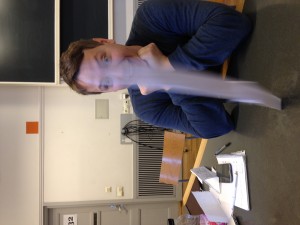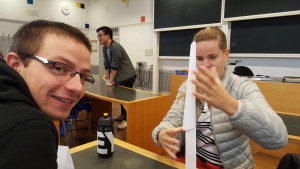Today we had a nice group work assignment during the lecture. The discussions regarding the situations which could occure when you are starting up a business were fun to do. Maybe for the next time a somewhat complexer company as an example can be usefull, because problems with a orange juice car can relative easily be solved. But nevertheless, the outcome of the discussions were good and learnfull.
After that we had to built the highest tower out of one piece of paper. That assignment was really fun, because our proces described a possible start-up perfectly. At the start we already saw that we were not going to make it with a length of two papers, because everyone was trying that. We decided to go for all or nothing, so we tried to make a tower with a length of three papers. We didn’t succeed and our tower collapsed. You also see this very often with start-ups. People try to be the very best, but just a few succeed in that and the other start-ups fail.



